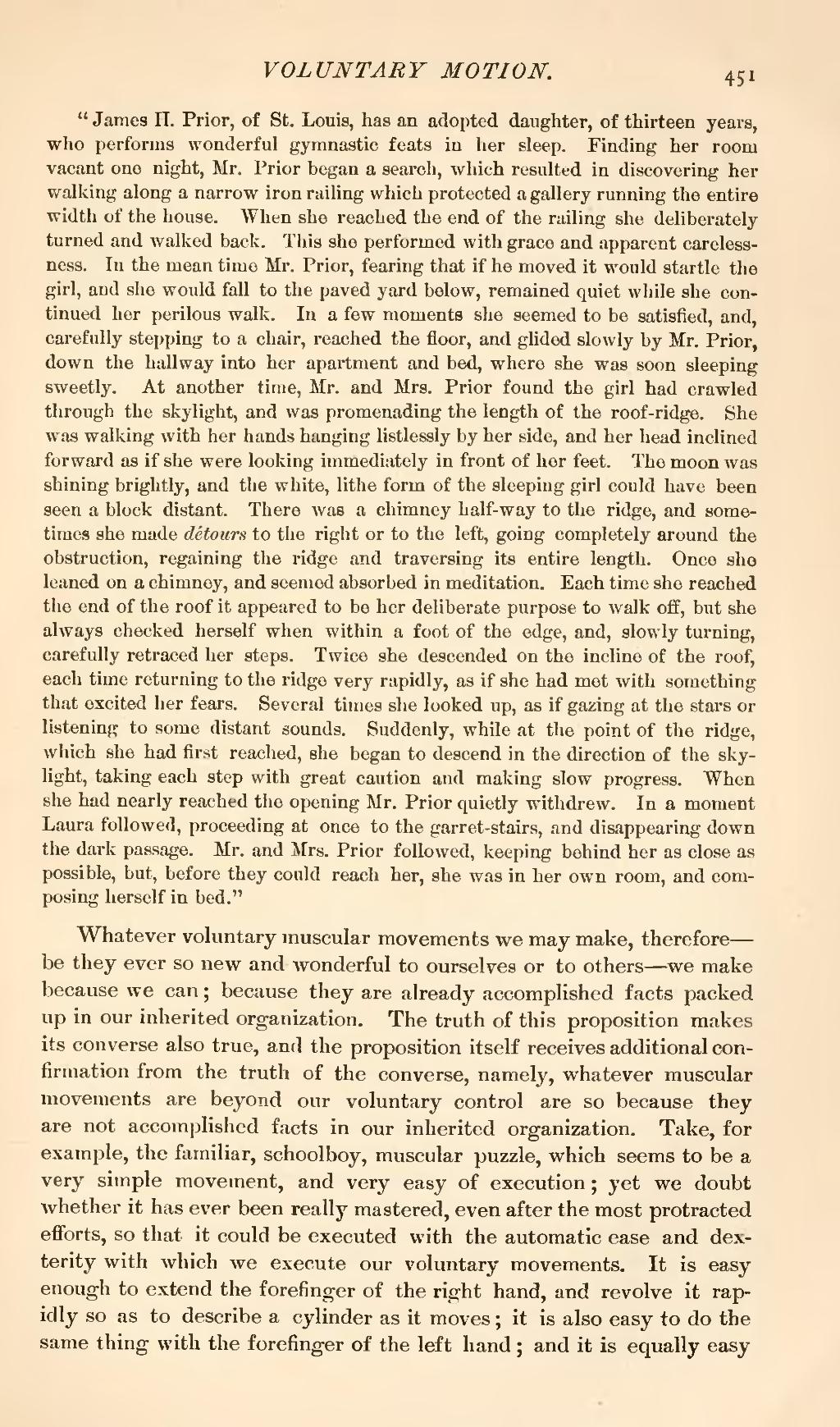"James H. Prior, of St. Louis, has an adopted daughter, of thirteen years, who performs wonderful gymnastic feats in her sleep. Finding her room vacant one night, Mr. Prior began a search, which resulted in discovering her walking along a narrow iron railing which protected a gallery running the entire width of the house. When she reached the end of the railing she deliberately turned and walked back. This she performed with grace and apparent carelessness. In the mean time Mr. Prior, fearing that if he moved it would startle the girl, and she would fall to the paved yard below, remained quiet while she continued her perilous walk. In a few moments she seemed to be satisfied, and, carefully stepping to a chair, reached the floor, and glided slowly by Mr. Prior, down the hallway into her apartment and bed, where she was soon sleeping sweetly. At another time, Mr. and Mrs. Prior found the girl had crawled through the skylight, and was promenading the length of the roof-ridge. She was walking with her hands hanging listlessly by her side, and her head inclined forward as if she were looking immediately in front of her feet. The moon was shining brightly, and the white, lithe form of the sleeping girl could have been seen a block distant. There was a chimney half-way to the ridge, and sometimes she made détours to the right or to the left, going completely around the obstruction, regaining the ridge and traversing its entire length. Once she leaned on a chimney, and seemed absorbed in meditation. Each time she reached the end of the roof it appeared to be her deliberate purpose to walk off, but she always checked herself when within a foot of the edge, and, slowly turning, carefully retraced her steps. Twice she descended on the incline of the roof, each time returning to the ridge very rapidly, as if she had met with something that excited her fears. Several times she looked up, as if gazing at the stars or listening to some distant sounds. Suddenly, while at the point of the ridge, which she had first reached, she began to descend in the direction of the skylight, taking each step with great caution and making slow progress. When she had nearly reached the opening Mr. Prior quietly withdrew. In a moment Laura followed, proceeding at once to the garret-stairs, and disappearing down the dark passage. Mr. and Mrs. Prior followed, keeping behind her as close as possible, but, before they could reach her, she was in her own room, and composing herself in bed."
Whatever voluntary muscular movements we may make, therefore—be they ever so new and wonderful to ourselves or to others—we make because we can; because they are already accomplished facts packed up in our inherited organization. The truth of this proposition makes its converse also true, and the proposition itself receives additional confirmation from the truth of the converse, namely, whatever muscular movements are beyond our voluntary control are so because they are not accomplished facts in our inherited organization. Take, for example, the familiar, schoolboy, muscular puzzle, which seems to be a very simple movement, and very easy of execution; yet we doubt whether it has ever been really mastered, even after the most protracted efforts, so that it could be executed with the automatic ease and dexterity with which we execute our voluntary movements. It is easy enough to extend the forefinger of the right hand, and revolve it rapidly so as to describe a cylinder as it moves; it is also easy to do the same thing with the forefinger of the left hand; and it is equally easy

